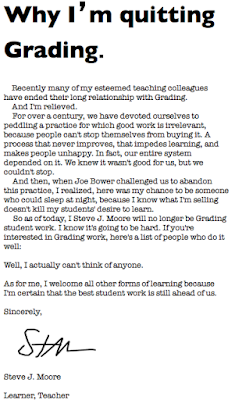Steve Moore has joined the Grading Moratorium.Want to join? Here's how.
Steve Moore
High School
Reading and Writing
Kansas City, USA
www.moreonthepage.com
@stevejmoore
by Steve Moore
High School
Reading and Writing
Kansas City, USA
www.moreonthepage.com
@stevejmoore
by Steve Moore
I’ve been trying to write this post for a long time. I started this draft nearly a year ago. Perhaps the most intriguing–and divisive–topic in education is grading. Why we do it, how we go about it, and when we report it are all issues of contention among educators, parents, and students. Figuring outassessment and its role in your school is a vital struggle for being able to do effective work in the system where you teach.
If you’ve ever set foot into a college Education classroom, you’ve probably heard of Alife Kohn. Maybe you’ve even read excerpts from Punished by Rewards or No Grades + No Homework = Better Learning. To a traditionalist, these concepts are heresy. The more “rigor” the better. Students should be under the weight of more content, deeper assignments, and even steeper bell curves if they are going to be able to compete in our economy.
Sounds familiar right? It’s been the standard message of “work-harder-endure-the-torture” education
reformers status quo proponents for over a century. Kohn stands in opposition to those ideals, but he’s only a theorist and easy to write off. I love theory, but in my own journey through exploring learning, I sought out a more real-world teacher example.
reformers status quo proponents for over a century. Kohn stands in opposition to those ideals, but he’s only a theorist and easy to write off. I love theory, but in my own journey through exploring learning, I sought out a more real-world teacher example.
That’s when I came across Joe Bower, a teacher from Canada on a mission to abolish grading, rating, and ranking in his classroom, have the tough conversations with parents, students, and administrators, and really explore what Kohn only writes about.
As a new teacher, rocking the boat is usually the last thing you want to do. Whether it’s standing up to blatant censorship or defending your own fledgling beliefs, it’s hard to not think of your mounting student loans, rent, and bills. You’d like to keep your job, ethics be damned.
That’s why, until now, I’ve stayed away from writing about this idea. I didn’t necessarily think I’d be let go, but I wasn’t sure I was ready to have the ensuing conversations with those above me. Joe has a list of people on his website who are participating in a Moratorium on Grading; they’ve each written about their decision and position in the process. I sent Joe a message on Twitter and explained that I was taking my time to write a thoughtful and intentional response before going public.
What spurred me to finally sit down and write about this last Summer was the AMC show Mad Men. I’m not the first person to write about education and this show. Education advocate and writer Sam Chaltain has written two pieces about democracy, capitalism, and education in the show, one for Huffington Post and the other on his blog. His pieces explore the important role that choice and desire play in our lives.
My ah-ha moment came about when Don, the bold protagonist and ad man, goes against his entire agency–and profession–to stand up to Big Tobacco. His firm Sterling Cooper Draper Pryce had Lucky Strike as a client for three decades and they represented half of their business cash flow. When they left unexpectedly, the company was thrown into turmoil. After work that day, Don sits at his typewriter writing into the wee hours of the morning. His character is an objective capitalist, but also deeply philosophical and pondering. The product of his scheming is this earth-shaking ad he places in the New York Times:
Seeing the effects of this on Draper and his firm was eye-opening; a true foil for my own profession’s struggles as Kohn, Bower, and others see them. His ad forced a sea change, something “rich and strange” as Ariel sings inThe Tempest.
Full fathom five thy father lies;
Of his bones are coral made;
Those are pearls that were his eyes;
Nothing of him that doth fade,
But doth suffer a sea-change
Into something rich and strange.
Sea-nymphs hourly ring his knell:
Ding-dong.
Hark! now I hear them — Ding-dong, bell.
Of his bones are coral made;
Those are pearls that were his eyes;
Nothing of him that doth fade,
But doth suffer a sea-change
Into something rich and strange.
Sea-nymphs hourly ring his knell:
Ding-dong.
Hark! now I hear them — Ding-dong, bell.
I knew I had to write my own letter to the world, to my profession. I felt ready to plunge into the cold black sea, no matter how unforgiving it may seem. Writing his letter led Don’s firm into an ad campaign with the American Cancer Society in direct opposition to Big Tobacco. Maybe mine will help me start some real conversations about learning rather than grading. Maybe people will start to think beyond the false choice of carrots or sticks and start thinking about true assessment, which really means “to sit beside.”



No comments:
Post a Comment